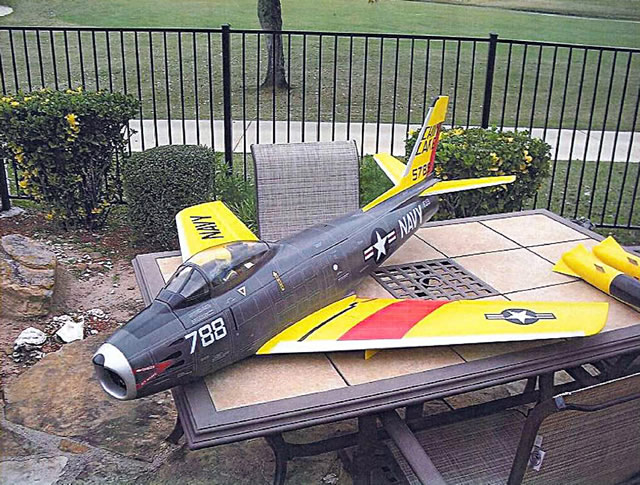
A remote controlled model of the US Navy's 1950s Sabre jet fighter that allegedly belonged to Rezwan Ferdaus, who was arrested on September 28, 2011 on charges of planning to fly explosive-packed, remote controlled airplanes into the Pentagon and the Capitol in Washington, authorities said. - AFP PHOTO / United States Attorney's Office District of Massachusetts
The recent arrest of Rezwan Ferdaus marked yet another turn in the ever-shifting struggle to protect the American homeland from Islamist-inspired acts of terrorism.
The 26-year-old from Ashland, Massachusetts, is accused of plotting to fly explosives-laden remote-controlled airplanes into the Pentagon and the U.S. Capitol. His arrest came after a lengthy investigation by the FBI in which Ferdaus had attempted to purchase and transmit weapons to individuals he believed to have been members of al-Qaeda but were in fact undercover agents with the FBI.
According to a federal affidavit, between June and September of 2011, Ferdaus “did knowingly and unlawfully attempt to provide material support and resources…detonation devices, communications equipment, weapons, training, and expert assistance and advice to a foreign terrorist organization, namely al-Qaeda.”
The affidavit continued, stipulating that Ferdaus “gave these items to undercover employees of the FBI…[whom] he believed were members of al-Qaeda, and did so intending that they would use the devices against U.S. service members serving overseas.”
Ferdaus had also rigged seven cell phones to act as detonation devices for a series of improvised explosives devices (IEDs). He gave these items to undercover agents he believed to be recruiters for al-Qaeda.
Upon subsequently being informed (falsely) that the cell phone trigger mechanisms had been successfully used to kill three members of the U.S. military in Iraq, Ferdaus replied, “That was exactly what I wanted.”
Ferdaus, of course, wasn’t satisfied with simply assisting al-Qaeda overseas. In addition, he concocted an elaborate and unorthodox plan for carrying out “jihad” against the U.S., which he considered an “enemy of Allah.”
During the course of the FBI’s investigation, it was revealed that Ferdaus had planned to fly remote controlled airplanes carrying C4 plastic explosives into the U.S. Capitol and the Pentagon, which Ferdaus considered the “military center” of America.
His plans exceeded mere abstract thought, as Ferdaus traveled to Washington, D.C., in May 2011 to conduct surveillance on his intended targets. Ferdaus also passed along two thumb drives to undercover agents containing detailed plans for carrying out his assaults, and he procured what he believed to be explosives and other equipment required to accomplish the attack.
The case of Rezwan Ferdaus underscores the evolving nature of the Islamist threat facing the United States. Where once our collective concern focused on sophisticated attacks in the air, we now find the most tangible threats resting on the unorthodox designs of lone wolf terrorists and small-cell collaborators with ideas for conducting terrorism far outside the mainstream of thought.
Our nation’s comprehensive counterterrorism apparatus has been effective in uncovering and inhibiting many of the 40-plus terror plots that have been thwarted since 9/11. In order to continue to do so, however, our counterterrorism efforts must remain proactive as opposed to reactive. Achieving this requires thinking outside the box and, most importantly, anticipating that the next attack may be far from what we would expect it to be.


























